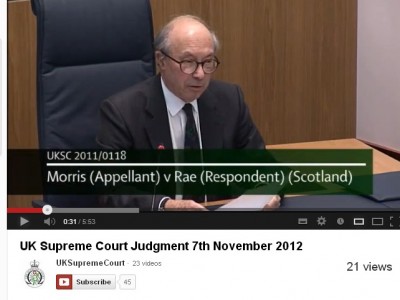Supreme Court judgments on YouTube
The Supreme Court is now giving judgments in the most open court imaginable: the court of public opinion, otherwise known as YouTube. As of today, the Supreme Court is making available a collection of 25 video summaries of its judgments given last term, between October and December 2012, on its own dedicated YouTube channel, UKSupremeCourt.
The Supreme Court is now giving judgments in the most open court imaginable: the court of public opinion, otherwise known as YouTube.
 As of today, the Supreme Court is making available a collection of 25 video summaries of its judgments given last term, between October and December 2012, on its own dedicated YouTube channel, UKSupremeCourt. This Wednesday, when it gives a further three judgments – in the cases of R (Prudential plc) v Special Commissioner of Income Tax; Zakrzewski v The Regional Court in Lodz, Poland; and Lloyds TSB Foundation for Scotland v Lloyds Banking Group – the summaries will be uploaded by lunchtime on the same day.
As of today, the Supreme Court is making available a collection of 25 video summaries of its judgments given last term, between October and December 2012, on its own dedicated YouTube channel, UKSupremeCourt. This Wednesday, when it gives a further three judgments – in the cases of R (Prudential plc) v Special Commissioner of Income Tax; Zakrzewski v The Regional Court in Lodz, Poland; and Lloyds TSB Foundation for Scotland v Lloyds Banking Group – the summaries will be uploaded by lunchtime on the same day.
The short films have a slightly unreal feel to them, as one watches their Lordships and Ladyship enter the empty court room and sit down solemnly at their curved bench. The case is announced, still to an empty courtroom, and the President or Deputy President of the Supreme Court (the latter, Lord Hope, is shown giving the summary in the image above), either reads a summary or hands over to the relevant Justice of the Supreme Court (JSC) to do so.
The summaries are those supplied with the judgments and are intended to give a media-friendly and litigant-friendly idea of what the case is about and what it decided, but they do not form part of the judgment itself and they are not designed to be treated or used as law reports.
It is worth remembering that ICLR, the leading provider of law reports for England and Wales, provide short summaries of all reportable judgments given by the Supreme Court within 36 hours of judgment as part of the WLR Daily series service. The latest cases are always listed on our home page and links are provided to them from BAILII transcripts of the relevant cases (as are links to our full reports) and from the special widget on the main Guardian Law page. You can search for all WLR Daily reports going back to 2009 on our website: go to Case Search and select Case Summaries.
Although ICLR has no immediate plans to incorporate video versions of its time-honoured law reports, which date back to before even the age of cinema, let alone TV, it has for a while had its own YouTube channel, TheICLR, on which you can find educational films about law reporting and the history of ICLR, as well as all our ICLR Encounters, intimate discussions before a select audience of topics of relevance to the law and legal writing.
Evidently, where ICLR goes, the Supreme Court is not far behind.